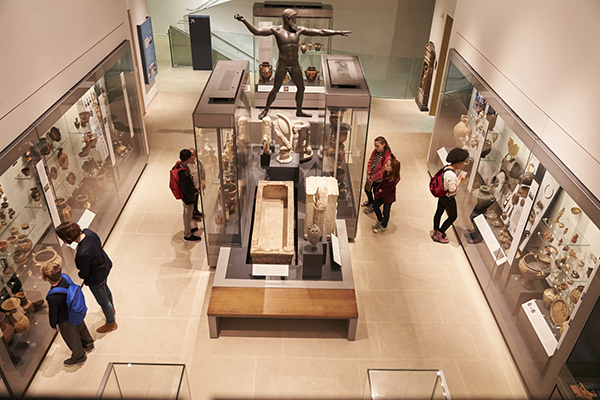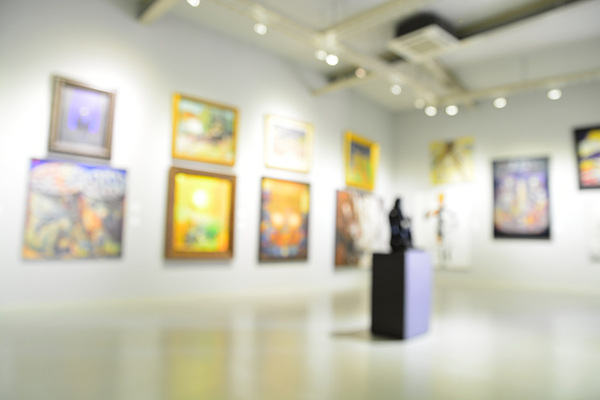INTRODUCE
Many of the world’s most famous museums have artifacts from all over the world. Some people feel that these artifacts should be returned to the places they originally came from, while others say that they should be kept in the museums, where they can be properly preserved.

PRESENT
STEP A EXPRESSIONS
Go over the first two expressions with your tutor and choose T for true or F for false. Then, guess the meaning of the third expression based on the clues provided.
1. Country/Place of origin refers to where a thing originally came from.
I thought my new shoes came from Australia, but when I checked the box, the country of origin was actually China!
I’ve been wrong about a product’s country of origin before. ( T / F )
2. Rightful describes something appropriate or proper.
I don’t think the zoo is the rightful place for wild animals.
I think outside is the rightful place for pet dogs to sleep. ( T / F )
3. .
Thieves looted thousands of paintings, books, and other treasures from abandoned museums during the war.
Q: What do you think loot means?
STEP B SPEAK YOUR MIND
Sometimes you want to express that you think a decision is reasonable and just.
Did you hear? The players who fought during the game got suspended.
Well, it’s only fair. They shouldn’t have fought in the middle of the game.
UNDERSTAND
READING
This is an online article about a museum’s plan to loan out some of its artifacts.

MOAP offers a compromise to Ethiopia
Last year, the country of Ethiopia made a formal request for the Museum of Arts in Paris (MOAP) to return its treasured artifacts. The artifacts, which include dozens of manuscripts and other religious objects, were looted from Ethiopia during the French-Ethiopian war in the 1800s.
MOAP denied the request, but the museum’s art director, Nicolas Charon, said that MOAP would be willing to loan a number of artifacts for an undisclosed amount. According to the proposal, a number of artifacts would be lent to Ethiopia for a period of six months and then returned to France.
After the announcement, several groups in the Ethiopian art community expressed their displeasure with the museum’s proposed deal. The Union for the Return of Ethiopian Artifacts (UREA) stated that the proposal was like rubbing salt into the wound. A representative from UREA explained, “They stole those artifacts from us, and now we have to rent them back? No, no, no. They should immediately return the artifacts to their rightful place here in Ethiopia with no strings attached. It’s only fair.”
Ethiopia joins the ranks of a number of countries formally requesting France to return their artifacts. A growing number of museum curators are also joining the fight to see treasures returned to their countries of origin.
TRIVIA
The phrase rubbing salt into the wound is used when someone makes a bad or painful situation even worse, just like how literally rubbing salt into a wound would make it hurt even more.
O I was unhappy that I didn’t get the promotion, and seeing the new guy get it just really rubbed salt into the wound.

PRACTICE
Choose the best follow-up sentences.
1.
Tutor: Did you hear about that blackout on 56th street?
Student: Yeah! I heard that there were several reports of looting. __________.
- People were fighting on the street.
- People broke into several shops and stole a lot of stuff.
2.
Tutor: I’m having a hard time looking for good quality furniture nowadays.
Student: Well, before I buy new furniture, I always check the country of origin first. __________.
- When I see it’s made in countries like the US or Canada, I buy it because I’m confident in the quality.
- When I see it’s made by a well-known brand, I buy it because I’m confident in the quality.
3.
Tutor: What’s that book about?
Student: It’s about a king who’s overthrown during a coup, but the people still think of him as their rightful king. __________.
- They start to wear special badges on their clothes to show their support for him.
- They start to wear special badges on their clothes to show how happy they are that he’s gone.

CHALLENGE
Challenge 1
You and your friend love to visit popular museums in Paris. Currently, there is an ongoing debate online about whether or not museums should return old treasures. Read a blog post by someone who disagrees with the idea of returning old treasures. Then, talk about it with your friend.
Today's Expressions
- country/place of origin
- rightful
- loot
Speak Your Mind
- It’s only fair.

They’re better off here.
By Abby Vincent
8:49 pm September 18

Presently in the French art community, people are debating whether museums should return artifacts to their places of origin.
In an interview last week, our president said that France should permanently return them to the countries they came from because it’s only fair. However, we have to think about much more than just being fair.
I admit that some of the artifacts we have were looted from other countries in the past, but there are a lot of reasons why it’s not practical to just give them back. For one, the treasures are safer here in France. Museums in many other countries lack the security and high-tech facilities that French museums have. Also, just last year, hundreds of priceless artifacts in the Middle East were destroyed by terrorists. Why should we return them if there’s a good chance they’ll just be blown up? Besides, even if the other countries could guarantee their safety, many manuscripts are too delicate to be moved. The simple act of taking them from one place to another might destroy them.
Secondly, the artifacts can be seen by many more people here in France. Yes, they came from specific countries, but aren’t they treasures for all mankind? Regardless of what others say, for me, the rightful place for them is definitely here in France.
Challenge 2
What do you think? What does your tutor think? Discuss.
 If Time
If TimeAllows
1 COUNTRY OF ORIGIN |
2 OLD TREASURES |
|---|---|
|
1 COUNTRY OF ORIGIN
|
2OLD TREASURES
|
FEEDBACK
I can read and understand a text about whether or not to return an old treasure.
LESSON GOAL ACHIEVEMENT
-
4
Very GoodCould complete the task with ease
-
3
GoodCould complete the task with some clarifications
-
2
FairCould complete the task with additional instructions
-
1
PoorCould somehow complete the task with difficulty
PERSONALIZED FEEDBACK
- RANGE
the ability to use a wide variety of vocabulary - ACCURACY
the ability to speak correctly - FLUENCY
the ability to speak smoothly without pauses or fillers - INTERACTION
the ability to manage a conversation

